Roger Daltrey on Woodstock, ‘Tommy’: Career-Spanning Interview
by Dennis Elsas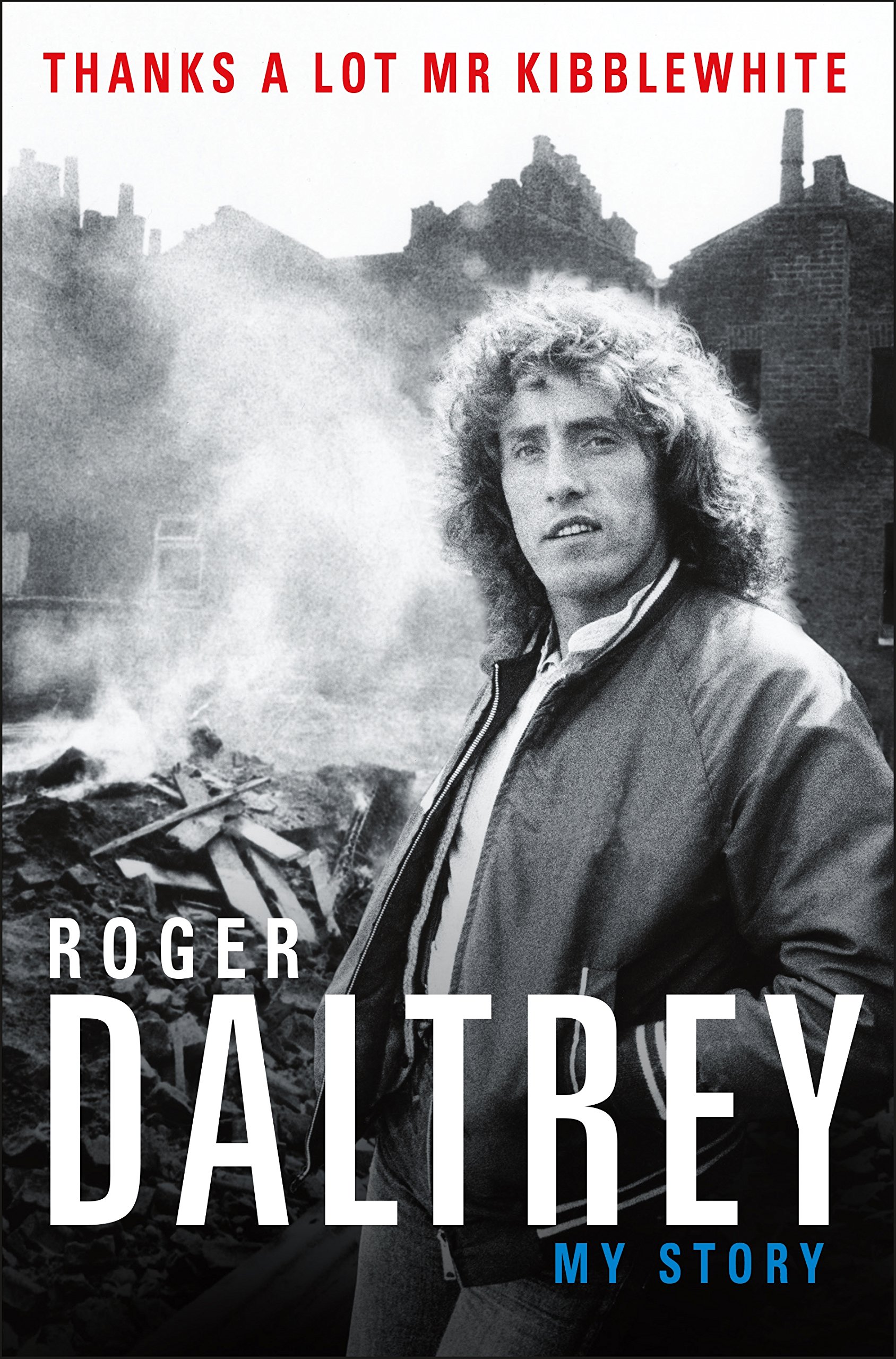 In 2018, Roger Daltrey released a solo album, As Long as I Have You, toured with local orchestras performing Tommy and other Who classics, and published his long-awaited memoir, Thanks a Lot Mr. Kibblewhite [available here]. “The Guv’nor” was born on March 1, 1944.
In 2018, Roger Daltrey released a solo album, As Long as I Have You, toured with local orchestras performing Tommy and other Who classics, and published his long-awaited memoir, Thanks a Lot Mr. Kibblewhite [available here]. “The Guv’nor” was born on March 1, 1944.
While on a book tour to promote the autobiography, Daltrey spoke to radio legend, Dennis Elsas, in a career-spanning discussion in which the singer shared his perspective on many previously unknown Who topics.
Elsas is, as many Best Classic Bands readers know, one of the most respected album rock air personalities in the nation. From a quarter-century-plus stint as a DJ and music director at WNEW-FM to his endeavors today as afternoon drive host at the esteemed WFUV and as co-host of the weekly Beatles talk and “call-in” show, “Fab Fourum,” heard exclusively on the Beatles Sirius/XM Channel (18) plus weekend shifts on Sirius/XM’s Classic Vinyl Channel (26), he has earned the regard of listeners and artists alike. Dennis occasionally presents his Rock ‘n’ Roll Never Forgets live multimedia show, a real treat that greater New York metro area rock fans should not miss. He celebrated his 50th anniversary on New York radio in 2021.
Best Classic Bands is pleased to be publishing excerpts of many of his interviews with classic rock legends as a regular feature: The Dennis Elsas Conversation, including ones with Robert Plant, John Fogerty, Gregg Allman and Bill Wyman.
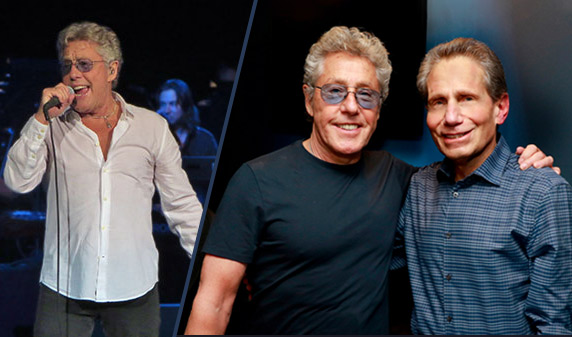
Roger Daltrey at Bethel Woods, June 2018 (Photo © Dennis Elsas); Daltrey and Elsas, 2018 (Photo via Dennis Elsas Archives; used with permission)
Dennis Elsas: The last time we spoke—it was a long time ago—you said, “Rock and roll saved my life.” And then as I’m reading the book, it’s ringing in my head and I’m thinking, okay, rock and roll saved my life. And how about Mr. Kibblewhite? Is he part of the story?
Roger Daltrey: He’s a very big part of the story. He was the headmaster of the grammar school that I went to and he expelled me. As he opened the door to let me out after giving me six strokes of the cane on my bare behind, as I left he said “You’ll never make anything of your life, Daltrey.” And, of course… “Thanks a lot, Mr. Kibblewhite, I’ll show you,” as a thought that went through my head with arrogance and anger. But I say it now as a real thank you because if he hadn’t done that, my life could have gone in so many directions.
DE: Any Who fan—and any rock and roll fan—is going to love the book, because it’s Roger’s version, not an “as-told-to.” And it’s not some author writing what he knows or guesses about Roger’s life and the Who and how they did this and how they did that. So you also get a tremendous amount of Who and Roger stories, some of which I never knew before.
And one of the first things I learned was that I think the very first time I saw you was the very same week you met your wife.
RD: 1967.
DE:I was at that Murray the K Holiday Show and it was the [U.S.] debut of The Who and Cream. We knew very little at that point because you hadn’t gotten that much airplay. We had no idea that Pete was going to smash his instrument.
RD: It was the craziest three weeks of our life. I think Murray the K was hoping to do five shows a day. We ended up doing four, I think, and the first one was at 11 o’clock in the morning. And because he had so many people on the show… he had Cream, the Young Rascals, Wilson Pickett, and then the other guests coming in and out every day, Smokey Robinson one day, Simon & Garfunkel, all these people coming through… these shows used to go on all day and we used to be stuck in this little dressing room. But we used to only do two songs, “Can’t Explain” and “My Generation.”
Related: Keith Moon – Rock’s greatest drummer
And then destroy instruments every night. It was insane and then spending the next two hours, gluing guitars back together because even us—with the nonchalant attitude to money that we had in those days—couldn’t afford a guitar three times a day. That was the first time I met my to-be wife, even though I wasn’t going out with her then.
DE: You are very direct in saying in the book, “I realize I am a portal for Pete’s songs.” Has the recording process been all these years that Pete comes up with demos that he’s created and now it’s time for Roger to make them Daltrey songs?
RD: I’ve always been a huge admirer of his talent. It was very obvious to me very early on, not only in his guitar playing but [also] in his songwriting that he was going to be a composer of incredible magnitude. In my opinion, he’s one of the greatest songwriters of the late 20th century.
DE: You say that you found your voice in Tommy.
RD: I mimicked the blues players. I mimicked James Brown. I could mimic Johnny Cash. And I could sing those songs with feeling. And then when Pete started writing those first songs, they were easy. “Can’t Explain,” “Substitute.” “Anyway Anyhow Anywhere.” And then he presents me with “Happy Jack.” The lyrics are nonsense. I struggled like mad to get any sense of anything out of that record. It was a hit; I don’t know why.
Then we got into “I Can See For Miles,” which started to become a bit easier for me. And then “The Seeker” and Tommy. And it all took off. Tommy was a platform in the studio because we were recording for so long. And each piece of music was so different, I had to juggle it around and when it came to the “See Me Feel Me” bits, I had to make the audience really feel that, so I internalized it and it came out like it is on the record.
It was only when we got it on stage that it really started to come to life.
DE: You also write about the Tommy movie experience and that you never expected the idea of becoming a movie star and that when [director] Ken Russell came after you, you were a little less than…
RD: I was a guy who couldn’t get into the school play. There was this director who we all—I’ve got to tell you, in Britain, we absolutely idolized Ken Russell. He was the enfant terrible of the film industry… so inventive! A genius director. And for Ken Russell to say he was going to make a film of Tommy, that was an honor. But for him to come to me and say “I want you to be Tommy,” it was kind of an honor but also incredibly terrifying. I said: “Ken, you think I can do it? I’ve never acted before in my life. Well, I’ll give it a go.”
DE: “Won’t Get Fooled Again” is one of the most powerful songs. You also relate [in the book] what it was like to perform that with the concert for 9/11, which—I hate to say this to everybody else—but you stole the show…
RD: It’s never been a competition and it’s not been about stealing shows. It’s about turning up and moving a crowd. That crowd moved us that night. I hope we moved them. I hope we helped them heal.
DE: Keith [Moon], of course, plays a very important part of the book. Some of the stories we are familiar with, some of the stories take on a slightly different bent. You do raise an interesting question whether the hotel rooms which you admit got trashed, got trashed to the extent that the owners of the hotels… you say that they were almost using it as an opportunity.
RD: We used to stay at a hotel called the Navarro on Central Park South… I don’t think it’s there anymore… but at the time I’m pretty certain that every time they wanted a suite redecorated, they put Keith Moon into it. And, of course, with his extravagant behavior, remodeling of furniture and fixtures and fittings, he’d leave and pay for the redecoration. I think, over time, Keith Moon probably redecorated at least forty percent of that hotel.
DE: There’s a quote in the book, where you described depression: “When you have depression, you go outside, and it can be a mid-summer’s day with the bluest sky, but you can’t find the dimmer switch to turn up the light.” When did you feel like that?
RD: I felt it in 2003, 2004, after John [Entwistle’s] death and we went through a lot of trouble in the band. And it just hit me like a ton of bricks. And I tried all the usual ways that people deal with it. I saw a shrink and I suddenly realized I was doing more analyzing of him than he was of me! Then he asked me about his mother, so I asked him about his, and I left. (laughs) So that didn’t do me any good. Then I tried the anti-depressants for three days and turned into a zombie so I thought: “This is the worst drug I’ve had in my life.”
I got lucky: someone recommended a hypnotist to me—who’s become a good friend, and someone, who I definitely believe, in some ways helped save my life. Because when you have depression, it’s so easy to see how some people take that one step too far, over the edge of a cliff.
DE: I’m reading the book—and of course I knew that you and the band were at Woodstock. But I didn’t know that you got there in a Volkswagen from your in-laws, from Connecticut?
RD: Yeah, just drove there. There was all this news on the TV, as you can remember. The Governor of New York had declared it a disaster area and closed all the freeways, so it was impossible to get in. But we’re sitting there in Connecticut, watching this on a Friday night and I’m thinking, “Well, how am I going to get there?” Because apparently you’re going to need a helicopter. And her father said: “We’ll drive there in the car.” The car being a Volkswagen Beetle.
So Herbie went to Woodstock. Anytime we hit any obstruction in traffic, we just drove around it. We just got there, completely normally, on time. We drove into the site… the band met at a Holiday Inn and then, later, we left for the site in the obligatory Hertz station wagon and we drove into the site at 7 o’clock, ready to go onto the stage at 9 o’clock… and ended up on stage at 5 o’clock in the morning. All that other stuff is legendary.
DE: I would be totally remiss if we didn’t discuss your very, very, very long and interesting—and at times—complicated history with Pete Townshend.
RD: How long have you got?
To hear the entire interview, click here.
Watch The Who perform a Who’s Next favorite at one of their 2020 acoustic dates
If The Who return to the stage, tickets will be available at Ticketmaster and here. Their recorded legacy—including many deluxe editions—are available in the U.S. here and in the U.K. here.
Related: Elsas celebrated his 50th anniversary on New York radio in 2021

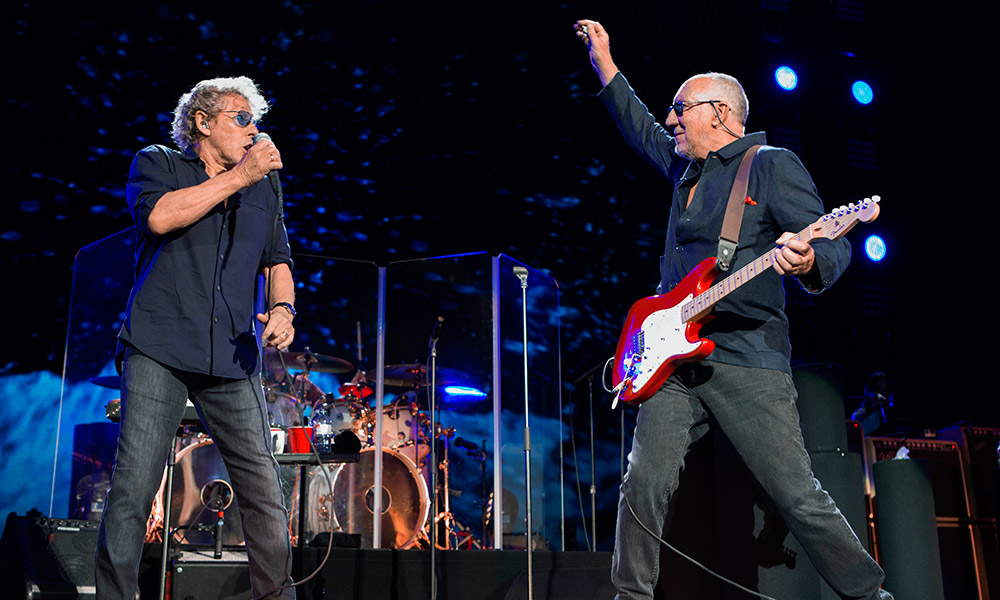

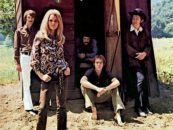
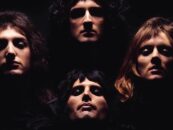
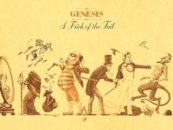

3 Comments so far
Jump into a conversationMy sweet babboo
Much respect for Dennis Elsas…..one of the very best at what he does!
Went to that 1967 Murray the K show to see Mitch Ryder saw Who, Cream, Wilson Pickett, Blues Project, gogo dancers and others. Remember they played Happy Jack bought the 45.